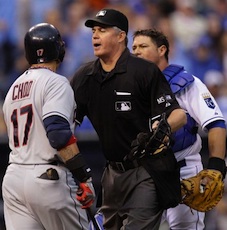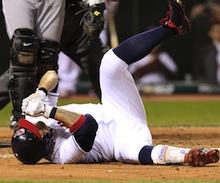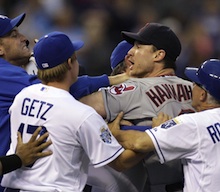 Indians Archive
Indians Archive  Opposite Field #6: The Rules of Retaliation
Opposite Field #6: The Rules of Retaliation
 Moments after Jeanmar Gomez harmlessly plunked Royals third baseman Mike Moustakas on Saturday—getting himself ejected after 2+ innings of work—an age-old debate tumbled into the Twiiterverse. In one corner stood the Old Schoolers—the “eye for an eye” traditionalists who believe in “protecting your own” and “making a statement.” In the other corner, rolling their eyes, were the Rationalists—believers in strategical wisdom over machismo. “What’s the revenge in shooting yourself in the foot?” they moaned.
Moments after Jeanmar Gomez harmlessly plunked Royals third baseman Mike Moustakas on Saturday—getting himself ejected after 2+ innings of work—an age-old debate tumbled into the Twiiterverse. In one corner stood the Old Schoolers—the “eye for an eye” traditionalists who believe in “protecting your own” and “making a statement.” In the other corner, rolling their eyes, were the Rationalists—believers in strategical wisdom over machismo. “What’s the revenge in shooting yourself in the foot?” they moaned.
Back and forth, spiteful tweets were exchanged (presuming something called a tweet can really be spiteful). And while the cavemen cited a triumphant, fired-up Tribe as proof of their beliefs, and the wussies pointed to a needlessly depleted bullpen as proof of theirs, neither side really won. This is mainly because both groups were exerting a lot of energy kicking the proverbial straw man. The issue isn’t whether or not you should retaliate for a beanball; it’s when and how you go about it.
On August 16, 1920, noted Yankee headhunter Carl Mays hurled the most notorious beanball of all time, sending the Indians’ beloved shortstop Ray Chapman to the hospital. Chapman would die 12 hours later from the head injury he suffered, but in the four innings played after the incident itself, Cleveland’s star pitcher Stan Coveleski enacted no immediate revenge for his injured teammate. Nor did player/manager Tris Speaker send in orders to put Babe Ruth on his ass, as far as anyone knows. The fact was, Cleveland couldn’t afford to get reckless. They were battling New York in a tight ballgame and an even tighter pennant race, with the Indians up just ½ game on the Yanks coming in to the day. Both Coveleski and Mays were staff aces, each with 18 wins already under their belts in mid August. And even with the Chapman injury delay, this pitcher’s duel would take less than two hours to complete, with Coveleski going the full nine innings in a 4-3 Tribe victory. His line: 9 IP, 3 ER, 2 BB, 4 SO, 0 HBP. Mind you, the Indians had no intentions of letting Carl Mays off the hook in the long run. But on this day, Coveleski sent his message through the scoreboard (of course, no one yet knew the severity of Chapman's injury, either, but the point stands).
For Old Schoolers, this bit of history is not particularly helpful. Their argument—which generally boils down to a call for immediate retaliatory measures after the beaning of a teammate—is usually packaged with an emphasis on the “unwritten rules of baseball, dating back to forever.” Sure, the tired old analogy of pro sports as an army foxhole will work, too, but more times than not, the retaliation defense is rooted in a sort of mythologizing of the game’s history, with big platitudes in place of concrete examples: “That’s how baseball has always been played. You hit one of our guys. We hit one of yours.” In fact, Indians closer Chris Perez basically said the exact same thing himself on Twitter after Saturday’s game: “You hit us, we hit you. Period.”
 In a vacuum, this ancient Babylonian perspective doesn’t exactly jive with the moral code of the modern world or the supposed “turn the other cheek” philosophy of the crucifix-laden Cleveland Indians. Add in the fact that the vast majority of beanballs are the inevitable, accidental consequences of a 30-team league with lots of shitty pitchers, and things start getting really hazy. Does the eye-for-an-eye argument really apply to every HBP? “You hit us, we hit you.” Or is it just something that applies to particularly cases, like a teammate (Shin-Soo Choo) being pissed because the pitcher that broke his thumb a year ago (Jonathan Sanchez) just plunked him again?
In a vacuum, this ancient Babylonian perspective doesn’t exactly jive with the moral code of the modern world or the supposed “turn the other cheek” philosophy of the crucifix-laden Cleveland Indians. Add in the fact that the vast majority of beanballs are the inevitable, accidental consequences of a 30-team league with lots of shitty pitchers, and things start getting really hazy. Does the eye-for-an-eye argument really apply to every HBP? “You hit us, we hit you.” Or is it just something that applies to particularly cases, like a teammate (Shin-Soo Choo) being pissed because the pitcher that broke his thumb a year ago (Jonathan Sanchez) just plunked him again?
In the end, like most things in sports, it comes down to egos above all else. And retaliation becomes less about justice, and more about appeasing players who’ve been literally and figuratively bruised.
Will zapping a fastball into Mike Moustakas’ back really convince the Royals to stop pitching Shin-Soo Choo inside, or terrify other MLB pitchers into changing their approach against the mean, vengeful Indians? Nope, it sure won’t. But is it a worthwhile thing to do? Yes, unfortunately, it usually is. And therein lies the paradox of retaliation-- a destructive act committed to create good will.
As the Rationalists will rightly point out, beanball retaliations accomplish absolutely nothing on the field itself. All you’ve done is put a runner on base and most likely surrender your pitcher and your manager for the rest of the game. Your “revenge” has only managed to reduce your own odds of winning. If you took this approach in a video game, the strategy would be laughably ridiculous. But the Rationalists/Wussies forget that, in a game with actual humans and their silly emotions (most notably pride), retaliation often is necessary—not to help you in that one game, but over the course of a full season. Rational or not, Shin-Soo Choo certainly seemed pleased that Gomez and a borderline maniacal Jack Hannahan had his back against Kansas City, even though Choo himself acknowledged he didn’t believe Jonathan Sanchez had hit him on purpose. Over the course of the season, knowing that his teammates would scrap for him makes for a more comfortable and confident ballplayer.
 So… we have concluded that retaliation is (a) the right thing to do, and (b) that it’s mostly for dumb reasons, rather than some glorious adherence to meat-headed baseball history. That just leaves the final step. WHEN do you enact your beanball revenge?
So… we have concluded that retaliation is (a) the right thing to do, and (b) that it’s mostly for dumb reasons, rather than some glorious adherence to meat-headed baseball history. That just leaves the final step. WHEN do you enact your beanball revenge?
Those applauding Jeanmar Gomez’s early exit from Saturday’s game probably didn’t feel quite as pleased when an overworked Cleveland bullpen blew a SEVEN run lead over the course of the next six innings. Gomez—well rested and pitching well—may have acted admirably in drilling Moustakas, but would the same message have gone unheard a few innings later? This is where machismo meanders into stupidity. Yes, appease the egos if you must. Play eye-for-an-eye if that’s how the game is “supposed to be played.” But hell, if there’s no statute of limitations on these things, just hit the guy on your 100th pitch and call it a night with a W by your name. The all-important message will still be sent and Josh Tomlin will have an extra day to work on that weird mustache of his.
Or better yet, do what Ubaldo Jimenez did and work out your crazy vendettas in the spring, when your bullpen still includes the Akron Aeros' starting rotation. Because for all the sweetness of a Choo-Hannahan bromance, most of Cleveland would still prefer just winning the damn ballgame.
- NBA Announces 2013-2014 Schedule
- Browns Ink Sharknado
- Sharknado A No-Show For Rookie Camp
- Trent Richardson Out Until Training Camp
- Browns Sign Brandon Jackson
- Carrasco Suspended Eight Games
- Browns Add to Wide Receiver Depth with David Nelson
- Browns Need to Learn from Past Draft Mistakes
- Browns Release Chris Gocong and Usama Young
- Browns Missing on Grimes Disappointing, But Not The End
The TCF Forums
- Chris Grant's first 3 drafts
Kingpin74 (Tuesday, January 21 2014 10:13 AM) - The 2014 Offseason Thread
googleeph2 (Tuesday, January 21 2014 9:36 AM) - 2015 Recruiting
furls (Tuesday, January 21 2014 6:57 AM) - Mike Brown
YahooFanChicago (Monday, January 20 2014 11:15 PM) - Movies coming out
HoodooMan (Monday, January 20 2014 9:34 PM) - 2014 Hoops Hockey Hijinx
jpd1224 (Monday, January 20 2014 4:44 PM) - 2014 Recruiting
jclvd_23 (Monday, January 20 2014 2:26 PM) - Wish List - #4 Pick
Hikohadon (Monday, January 20 2014 1:26 PM) - Official- Browns Coach Search/Rumors
OldDawg (Sunday, January 19 2014 6:48 PM) - #1 overall pick Anthony Bennett
TouchEmAllTime (Sunday, January 19 2014 1:28 PM)


